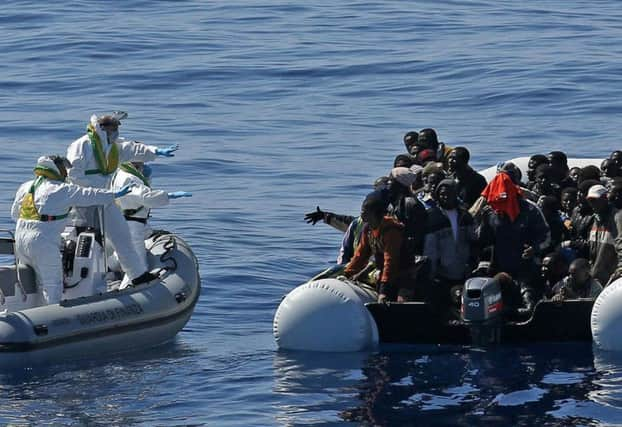Leaders: EU will be judged on its moral response


It is a necessary humanitarian response to a tragedy of unimaginable horror, in which thousands of men, women and children fleeing war-torn North Africa have already met their deaths by drowning.
The Royal Navy ship – with its amphibious transport dock and helicopter deck – is one of the most modern in the fleet, and its capabilities will be perfect for the job of helping ships to safety.
Advertisement
Hide AdAdvertisement
Hide AdIn truth, however, this measure addresses only the symptom of an underlying problem. There are desperate people in Libya and Egypt who will risk everything to get to Europe and the peace and opportunity represented by western freedoms.
Naval ships such as HMS Bulwark will be able to pick up larger vessels, but it will struggle to detect smaller ones. So its deployment may simply make people-smugglers resort to smaller and ever more dangerous boats.
It will take an enormous amount of work – co-ordinated across the European Union countries and their Mediterranean neighbours – to prevent many more deaths.
Any honest acknowledgement of the problem must, however, recognise that it cannot be solved at sea.
The solution does not solely lie in intercepting the flotilla of vessels – it lies in ensuring that these vessels never leave the shore.
In an area of unprecedented civil unrest and civil war, with the power of central governments in the region compromised and weak, no-one is saying this is going to be easy. It will be a formidable challenge to the diplomatic skills of EU countries and their relationships with emergent powers across North Africa and the Middle East.
But it is now an essential aspect of our foreign policy and humanitarian credentials in a region where cynicism about, and distrust of, the West is understandably common. The solution has to be a political one, capable of engaging the police and military authorities in these countries to take action.
In their sights should be the smugglers who have shown such despicable lack of compassion for their human cargo.
Advertisement
Hide AdAdvertisement
Hide AdSeemingly inured to the distressing loss of life they have caused, these merchants in misery must have their businesses closed down and their vessels destroyed.
Just as importantly, the EU must ensure genuine refugees are still capable of getting across the Mediterranean and claiming asylum. We have responsibilities to those who seek to escape persecution, and the need to stem the influx of migrants should not have the side-effect of shutting the door on genuine refugees.
The difficulties should not be underestimated, but this is one of the moral challenges of our time, and we must not be found wanting.
Hard truths about North Sea oil
When the Chancellor, George Osborne, used the Budget to announce a range of tax cuts worth billions of pounds to aid North Sea oil and gas firms, there was a collective sigh of relief in an industry that expected the low oil price to cost tens of thousands of jobs.
Nobody believed these measures were going to be enough to prevent significant damage to the industry. Nor did they anticipate that the Chancellor’s actions would be his last word on the matter.
The evidence of this was plain yesterday with the news that Trap Oil is on the brink of insolvency. Prospects do not look good for the company after it issued a statement saying it had “insufficient resources to continue operating beyond the short term”.
There is a serious challenge in the North Sea facing whatever government gets elected in May.
The oil price is not going to recover any time soon, but it is essential that skills and expertise are not lost to the industry, so that when the price picks up, the North Sea can increase its productivity accordingly.
Advertisement
Hide AdAdvertisement
Hide AdAny further assistance will not be given out of the goodness of the Treasury’s heart. As voters in Scotland who lived through last year’s independence referendum will be only too aware, oil revenue has been an important part of the UK’s finances for half a century. It is in the Treasury’s interests to prolong North Sea oil for as long as possible and ensure the maximum amount is commercially extracted.
It is unclear how many firms will go under before the full extent of job losses is known, but Trap Oil will certainly not be the last to stare insolvency in the face.